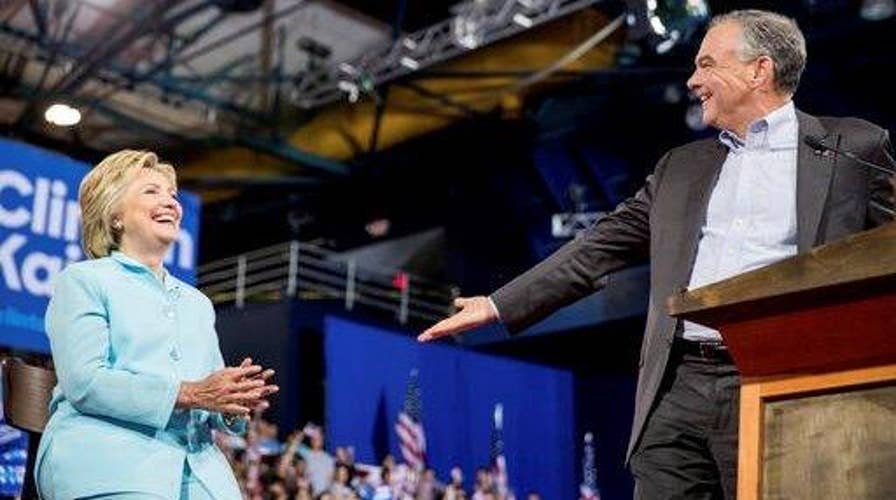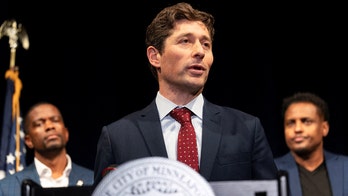The media are giving their official blessing to Hillary Clinton’s choice of Tim Kaine, praising him as a calm, experienced and slightly dull guy who can help her govern.
What they are not doing is picking the Virginia senator apart, and highlighting his disagreements with the nominee, which marked the coverage of Donald Trump’s selection of Mike Pence.
I happen to think that both Kaine and Pence are solid and serious choices who share some similarities, as both are religious and make little attempt to be flashy. But different media standards seem to apply.
Of course, Trump’s veepstakes was a roller-coaster ride that attracted relentless coverage as he tried to decide among Pence, Chris Christie and Newt Gingrich, at one point second-guessing himself. Clinton’s process was deadly dull—Kaine was always the front-runner, despite some buzz for Tom Vilsack and the press playing up Elizabeth Warren—and even the way she texted the choice on Friday night seemed to mute the coverage.
Pence may be an avid Christian, sitting governor and ex-congressman, but many of the accounts examined him in terms of drawing evangelical votes, differing with Trump on immigration and how his low-key personality doesn’t match the Trump brand.
If the media took a similarly adversarial approach on the Democratic side, they would be demanding to know how Kaine can run with Clinton when, as a Catholic, he is personally opposed to abortion and the death penalty. (He follows the law on both subjects.)
The Weekly Standard has a piece on how Kaine supports the Hyde amendment, which bars federal funding for abortion, and how he deflected a question on efforts to oppose that amendment in the party’s platform. But that story isn’t getting much traction.
The same goes for Kaine’s position on free trade, which is more traditionally supportive, as Clinton was until Bernie Sanders pushed her to the left. It so happens that Kaine chose Saturday to come out against the Trans-Pacific Partnership, joining his running mate. Haven’t seen any flip-flop stories.
And Kaine’s stance on banking regulation is more favorable to the industry than Hillary’s. Why is the press not pounding away at that?
MSNBC has been hailing the choice, and reporting favorable tidbits: He gave a Senate speech in Spanish! He won a spelling bee! He plays the harmonica!
The New York Times introduces the former Virginia governor and Richmond mayor by saying that “Mr. Kaine has deftly managed his own rise as a progressive in a bastion of Southern conservatism.” He is “driven by Jesuit ideals.”
The abortion and death penalty questions are dealt with in a sympathetic way:
“He gets an F rating from the National Rifle Association, but a perfect score from Planned Parenthood, despite his personal opposition to abortion, which he says is a matter of his Roman Catholic faith.” In the past, when “Mr. Kaine’s opposition to the death penalty became a central issue. Mr. Kaine managed to deflect it with an ad in which he stared into the camera and declared his position a matter of faith; he won 52 percent of the vote.”
Another Times story said that “in selecting Senator Tim Kaine of Virginia as her running mate, Hillary Clinton is sending the clearest signal yet that she is confident she will win the presidential election…His value is almost entirely about governing — about what he can do for Mrs. Clinton in the White House rather than at the ballot box.”
Do you recall many references to Pence helping Trump govern?
The Washington Post says Kaine is “completing a Democratic ticket that prizes experience and traditional notions of public service in a political year dominated by Republican rival Donald Trump’s unorthodox, highly personal brand of leadership…
“Kaine’s affable, regular-guy presence may also help balance the perception of Clinton as remote, chilly and privileged.”
Virginia is part of the Post’s turf, and the paper deserves credit for two more skeptical pieces. One is on left-wing groups not liking the pick:
“Several organizations, including some with ties to Sen. Bernie Sanders (I-Vt.), the runner-up in the Democratic primaries, sharply questioned Kaine’s liberal bona fides, pointing to Kaine’s support of trade deals and regulations favorable to big banks.”
The other is something that Kaine did as governor and lieutenant governor that was legal but smells awful: accepting $160,000 in gifts, including an $18,000 Caribbean vacation and $5,500 in clothing. Former Virginia governor Bob McDonnell was later convicted for accepting gifts from a businessman seeking favors, but that was overturned by the Supreme Court.
While there have been media mentions about Kaine’s gift-grabbing, they tend to be framed as criticism from the other side, as in this Post piece:
“Republicans have signaled in recent days that they will use Kaine’s acceptance of that and other freebies as a line of attack against the newly selected vice presidential candidate, looking to stoke concern among Democrats that Kaine is not the progressive candidate they had hoped for.”
Politico loved his Florida speech—“Kaine Brings Down the House in Miami”—and also offers this upbeat assessment:
“In Kaine — a politician who has never lost a race, whose name has topped Clinton’s list of potential running mates since the process began in earnest back in April — the former secretary of state picked a partner who is similarly heavy on experience and light on dynamic political charisma.
The hope, Democrats said, is that the Clinton-Kaine ticket will underscore to voters the value of a steady, dependable hand, at home and abroad, when contrasted against the inconsistent and mercurial Donald Trump.”
Everyone says Kaine is boring—he pleaded guilty to that charge on “Meet the Press”—but in the current hyperpartisan environment, boring translates into pretty placid coverage.

























